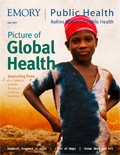Touched by cancer

Dean James W. Curran
Chances are you know someone affected by cancer. Here at Rollins, researchers are attacking the disease from all angles—from prevention and early detection to tracking quality of life and outcomes—with the goal of reducing the overall incidence of cancer. Through their own research and interdisciplinary studies with others, Rollins scientists are involved in more than 50 cancer research projects.
For more than 20 years, we have been home to the Atlanta Surveillance, Epidemiology, and End Results registry, funded by the National Cancer Institute (NCI), and the Georgia Comprehensive Cancer Registry, funded by the CDC. These registries inform state and the federal experts on cancer incidence and outcomes in metropolitan Atlanta and in Georgia. They also provide a base for other population-based outcomes research.
Our cancer efforts are strengthened through collaborations with the CDC, the American Cancer Society, the Georgia Research Alliance, and the Georgia Cancer Coalition (GCC). Among our faculty are several GCC Distinguished Cancer Scholars, who are part of a statewide scientific community committed to saving lives.
Several of our faculty members hold joint appointments in the Emory Winship Cancer Institute, which just became the first NCI-designated cancer center in Georgia. Winship’s Cancer Control and Population Sciences core is based in the RSPH and led by epidemiologist Robin Bostick.
All of us have experienced the tragedy and suffering caused by cancer. In public health, these instances are stark reminders of the importance of prevention—reducing tobacco use in China, encouraging early breast cancer detection among undeserved women in Atlanta, reducing obesity in rural Georgia, or understanding the unknown causes of many cancers. We dedicate this issue to people everywhere who are touched by cancer and who are working to stop this disease.
Sincerely,
James W. Curran, MD, MPH
Dean


